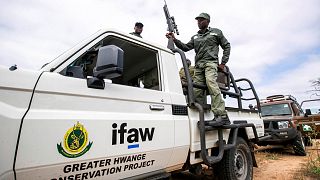Zimbabwe
In Zimbabwe, increased wildlife presence near communities is making children who trek long distances to school anxious about potential attacks. Authorities and parents believe that a new initiative focused on teaching children to identify threats could help lessen this danger.
The Save Valley Conservancy spans a massive area, serving as a sanctuary for wildlife in Zimbabwe.
Giraffes wander freely while elephants search for water to quench their thirst across the 750,000-acre game reserve.
However, these big creatures face challenges due to conflicts with humans.
Wildlife is edging nearer to human communities, making the journey to school more risky for children.
Fourteen-year-old Esther Bote is among the students learning life-saving skills.
She noted that, “Going to school is always a scary experience because we pass through thickets, sometimes we see animal footprints. We learnt strategies to co-exist with wildlife, what to do if you meet an animal, to read wind direction, using sand and many other things."
The Save Valley Conservancy, a privately-owned entity, with the national parks agency, run a program that teaches people how to identify danger signs and live harmoniously with wildlife.
Dingani Masuku, the community liaison manager at Save Valley Conservancy, stated, "Children are the most impacted in a community. They are the ones who attend school, care for animals, collect water, and gather firewood. Therefore, all children are significantly affected. This is why we focus on schools. While we have various initiatives, this specific program aims at educating schools about animal behaviour."
Esther and her friends recently discovered elephant footprints while walking home from school and informed a wildlife ranger about it.
The elephants had crossed a farming field and a bush path that the group frequently uses.
Just a few days earlier, a child had been seriously hurt in a crocodile attack.
While there is currently no solid evidence regarding the initiative's effectiveness, the school has been leveraging it to persuade some hesitant parents to alter their views.
Many parents support the training but request adjustments, like permitting their children to arrive later for school.
In rural areas impacted by this issue, school officials frequently have to push back the start time and end classes earlier, ensuring that children can travel to and from school in daylight when wild animals are less active in the vicinity.
The Zimbabwe National Parks and Wildlife Management Authority reports that the country's parks agency is advocating for the introduction of animal behavior and conservation training in schools nationwide.
This effort aims to address the growing need for communities to coexist with wild animals that are frequently entering urban areas for food and water due to droughts caused by climate change.













02:19
South African actor Embeth Davidtz makes directorial debut with Rhodesia-set drama
01:05
Study finds millions of children at risk as global vaccine rates fall
01:52
138 million child workers globally in 2024, number down from 2020
00:24
Greenland and Iceland saw record heat in May
01:30
Macron sparks global push to protect oceans
01:06
Experts warn of an increase in Glacier-related risks from climate change